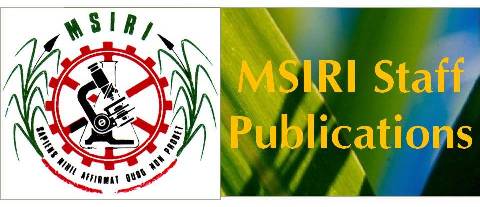Application of plant biotechnology in sugar cane
| MSI09P4334 | |
| Parmessur, Y. | |
| Application of plant biotechnology in sugar cane | |
| Mauritius Institute of Education and Society of Biology Teachers., Symposium: Biology Education: Challenges and opportunities, 23-24 July 2008, Mauritius Institute of Education, Réduit: Abstracts | |
| Symposium Biology education: challenges and opportunities, 23-24 July 2008, Mauritius Institute of Education, Réduit, Mauritius | |
| book chapter | |
| 2008 | |
| p. 44-45 | |
| Réduit: Mauritius Institute of Education | |
| Abstract only | |
| En | |
| En | |
| At the Mauritius Sugar Industry Research Institute (MSIRI), the Biotechnology Department has its activities focused on four main themes. This paper aims at presenting the departmental research activities in applied biology focused mainly on the main themes namely tissue culture for plant micropropagation, genetic transformation, disease diagnostics and molecular breeding. Sugar cane in vitro culture has been carried out since 1993 primarily to speed up the propagation of newly-bred varieties. This technique also enables elimination of sugar cane diseases from infected cultivars. With the existing facilities, some 300 000 disease-free plantlets can be produced annually. Propagation of potato. banana, aloe vera and ornamentals are also being carried out by tissue culture which is also used in the genetic transformation of sugar cane varieties. Herbicide and drought tolerance traits have been introduced into sugar cane using the biolistic particle delivery system and transformed plants are currently being assessed in the glasshouse. A range of PCR-based tests are in routine use for diseases diagnostics of sugar cane and Real-Time RT-PCR has also been developed for Sugarcane yellow leaf virus and the potato viruses (PV). The sugar cane breeding programme is also being enhanced by the application of molecular markers (Marker-assisted breeding, MAB). The main objectives of this programme are to shorten the sugar cane selection cycle, to identify promising heterotic parents and to assess genetic diversity among the sugar cane germplasm. Traits under study includes disease resistance, high sucrose content and early sucrose accumulation. Access to the Biotechnology laboratory is restricted in conformity with ISO 17025: 2005 which the MSIRI is putting into practice to acquire accreditation from the Mauritius Accredition Service. However, to promote its research activities among biology students, the departmental staff is always of valuable help and may be available for supervising scientific projects and for the training of graduates. The latter will eventually be recruited in other research institutions or as educators in the secondary sector. | |
| sugarcane biotechnology tissue culture plant micropropagation genetic transformation disease diagnosis molecular breeding | |
| Mauritius | |
| Sugarcane: Cane breeding and genetic improvement | |
| Genetic techniques and protocols | |
| 2009-01-13 | |
| En | |
| BIOTECH | |
| CAT | |
| BIOTECH |
